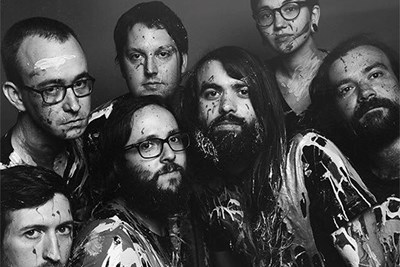Session from 1986 to be Part of Box Set
 Image by Ed Brennen
Image by Ed Brennen
08/30/2018
By David Perry
When the Pixies showed up at UMass Lowell’s student-run WJUL on a chilly Monday evening, they were just another new band out of Boston.
They retreated to the small “Fallout Shelter” studio in the basement of Lydon Library, where bands have been playing live sets on air for nearly 33 years. Tape rolled. The musicians plugged in and ripped through 15 songs. There was a brief interview. The four Pixies packed up and left. It was Dec. 15, 1986, long before they cast a huge shadow over rock music.
At the time, Pixies were “just another interesting band out of Boston that no one really knew about,” says Music Department chair Alan Williams. “They were making a sound that would earn them a place in history long before fame came their way.”
The recording made that night captured a band on the cusp of breaking through. The music was raw, spontaneous, powerful. In music circles, the notoriety of the “Fallout Shelter” tape grew. But over the years, the radio station lost track of the original recording.
Now, more than three decades later, WUML staff (the station changed its call letters in October 2003) and alums are beaming with pride as Pixies’ “Fallout Shelter” performance will be released Sept. 28 as part of Come On Pilgrim…It’s Surfer Rosa, a three-CD or –LP box set celebrating the 30th anniversaries of Pixies’ seminal Come on Pilgrim and Surfer Rosa recordings. The recording is the result of some dogged detective work on the part of a station employee and the deep allegiance of alumni who wanted to make sure the project was done right.
“It’s really incredible,” says senior Chris Romano, WUML’s current station manager. “I mean, so, so cool. Not only did they play in this station, it’s going to be released. It’s one of the better-known moments in the station’s history.”
The Crooked Road Of Rock ’n’ Roll History
Pixies were invited to perform at WJUL by former student Chris Porter (currently a well-known concert promoter). He founded the weekly “Live from the Fallout Shelter” program with Bob Weston ’88 (who went on to play bass in Volcano Suns and Shellac, while carving out a stellar reputation as a recording engineer). The show was a way to showcase rising local talent. Like Pixies.
“I thought they were a cool band, and it was a good session, but I never knew this might happen.” Porter says.
Pixies exploded onto college radio, recorded four albums and sold out large venues before splitting in 1993. They re-formed in 2004 and continue to tour. Their fans included David Bowie, Weezer, Radiohead and Nirvana’s Kurt Cobain. To die-hard fans, the WJUL show was legendary.
“College radio has always been about finding the next great unknown act,” says Williams.
Last spring, history circled back to that December evening in the Fallout Shelter.
In April 2017, a representative of Pixies’ label called Romano. They were interested in the recording.
Months later, WUML received licensing information from the label noting that the Surfer Rosa box set would contain the “Fallout Shelter” tracks and an interview recorded at the station.
“Wow,” thought WUML operations manager Tom Tiger. “This really is in motion.”
Tiger knew any release of the recording had to be done correctly. He wanted to make sure the students, the university and especially all the alumni who worked on the recording were properly credited.
However, after listening to the tape that was believed to have been recorded at WJUL, Tiger thought something was off. He asked the others who were in the studio that night for help. That kicked off weeks’ worth of detective work in a hunt for the original tapes. A Facebook group chat for ‘80s WJUL alumni was created.
From a comment on Facebook, it came to light that the recording wasn’t from WJUL. Instead, it had been recorded in Boston at Emerson College’s radio station, WERS.
That realization was a setback, but Tiger knew the WJUL tapes existed somewhere, and he was on a mission to find them.
Tiger scoured tape trader sites online and found a copy of the WJUL show.
Then, Weston, who was the WJUL sound engineer on the night of Pixies’ performance, reached out: He had the original reels. He had last listened to them in 2004 and said they were in rough shape, but added that superior digital tools now existed that could be used to restore them. Weston offered to help.
The record label agreed, and a deal was signed. Weston restored and mastered the show for the world to hear. His work on the notorious Pixies show had come full circle.
As he waits for the box set to drop, Tiger reflected on the experience of tracking down the missing recordings.
“I guess the lesson here is keep on it,” he says. “Another lesson is that the university radio station alums are proud and protective of their legacy.”
Indeed. Tiger remembered something that Weston wrote in an email to him.
“WJUL,” he said, “changed my life.”


